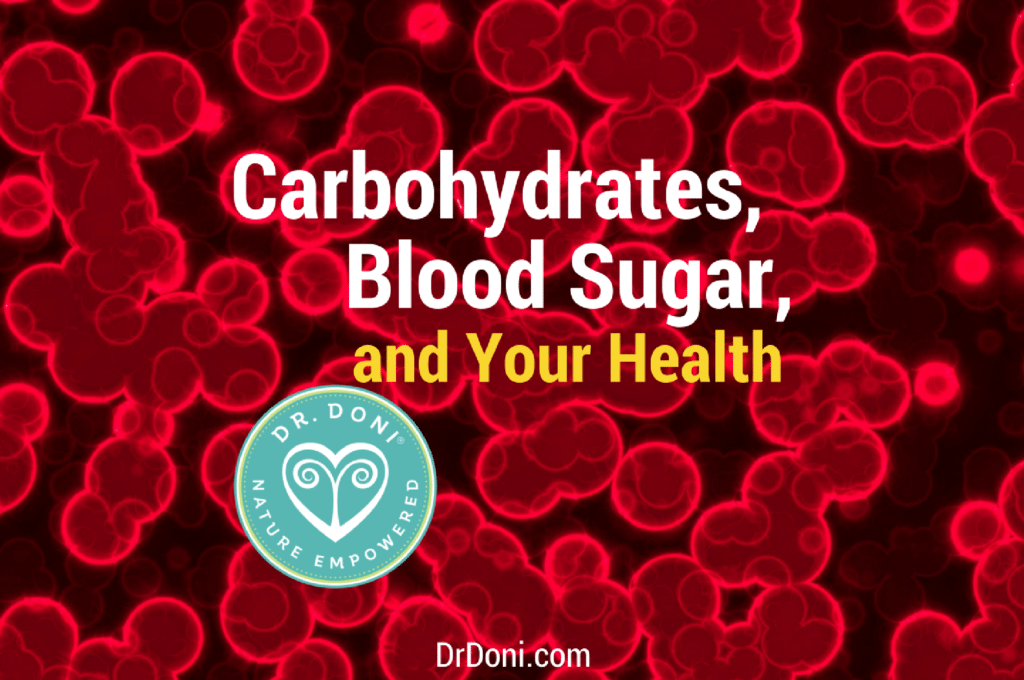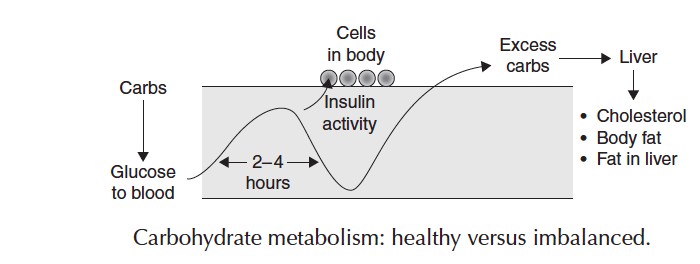
Carbohydrates, Blood Sugar, and Your Health
- Home
- Stress & Adrenal Fatigue
- Carbohydrates, Blood Sugar, and Your Health

Dr. Doni, author of The Stress Remedy, explains why an imbalanced carbohydrate metabolism means awareness of blood sugar levels is important for all – not just diabetics.
Those of who read my blog frequently know that I talk about three problem networks: adrenal distress, leaky gut and imbalanced carbohydrate metabolism. Today I’m going to be going to focus on the third – carbohydrate metabolism.
Did you know that even when your blood sugar levels are within normal range, they could have an effect on your health?
It is not often known that blood sugar balancing is a good place to start for so many health issues including:
- Fatigue
- Headaches/Migraines
- Sleep issues
- Skin rashes
- Candida
- PCOS
- Fertility
- ADD
- Anxiety
- Depression
- and more.
This is because fluctuations in blood sugar, even if they are not severe enough to be categorized as diabetes, can put stress on your body. High blood sugar requires us to produce more insulin to enable our bodies to use the sugar for energy. Then, when our blood sugar dips, our body produces more cortisol to help restore blood sugar levels. This is why many people experience spikes and dips of energy after they eat or when they go a long time between meals.
The subsequent elevated insulin and cortisol levels perpetuate a vicious cycle of further imbalanced blood sugar levels, sugar cravings, weight gain, inflammation, and stress. When this pattern continues over time (years), it increases your risk of developing diabetes, heart disease, dementia, and even cancer. This is why I consider it to be one of the three major problem networks.
All of that sounds very complicated, so, let’s start at the beginning by asking:
What Are Carbohydrates?
Food is made up of three main components: fat, protein, and carbohydrates and we need a balance of all three in our diet in order to be healthy.
Foods that are primarily made of carbohydrates are:
- Breads
- Pasta
- Rice
- Cereal
- Grains in general (quinoa, oats, millet, and corn)
- Fruits
- Vegetables
Sugar (white and brown sugar)—also called sucrose—is completely carbohydrate, as is the sugar in milk products (lactose). Legumes (beans and lentils) and nuts contain carbs, fat and protein.
What Happens to Blood Sugar When We Eat Carbohydrates?
When we consume foods that contain carbohydrates, first they are digested by enzymes, starting in your mouth while you are chewing and continuing in your intestines once you have swallowed, until they are broken down into the smallest sugar molecules—glucose. Next, the glucose is absorbed through your intestinal lining and makes its way into your blood resulting in an increase in your blood sugar.
Some foods containing carbs are more likely to raise your blood sugar level quickly—such as straight sugar—those foods are referred to as “high glycemic.” When your blood sugar goes up quickly, you might feel agitated or sleepy.
Then you are also more likely to experience a rapid drop in blood sugar, leading to nausea, headaches, irritability, and lightheadedness (I’m going to explain why that happens next). Fat, protein and fiber slow down the process of digestion and absorption of glucose, effectively slowing the rise in blood sugar and preventing the roller coaster of symptoms.
Once in the blood, glucose is available to be moved into your cells, with the help of the hormone insulin, where it is converted into energy for your brain and body to use. If the amount of glucose in your blood exceeds the ability of insulin to move it into your cells, then at first your body will make more insulin.
If the pattern continues, however, then your cells will become less responsive to insulin—insulin resistance—leaving glucose in your blood. Any glucose remaining in your blood is stored in your liver as glycogen (to be used when your blood sugar level drops), or it is converted into fat and stored in fat cells in your belly, hips, thighs, and all the places you don’t want it, as well as in your liver and as cholesterol in your blood (see Fig.1 from The Stress Remedy book).
The entire process, from blood sugar levels rising, all the way to blood sugar levels falling, takes approximately two to four hours depending on your insulin function.
People often erroneously think they will burn fat when they don’t eat, but that’s not the case. When your blood sugar levels fall, and glycogen stores have been used up, the body predominantly breaks down muscle, not fat, to make more glucose.
So to sum it all up, glucose (from carbohydrates) is essential for your body, however you need just enough and not too much. When you eat, your blood sugar goes up, and over the next couple hours, your blood sugar goes down. If you don’t eat, your body will find glucose from within your body, mainly by breaking down your muscles. It is far better to feed your body a healthy amount of carbohydrates than to eat too much and store fat, or to eat too little and burn muscle.
There are several things that can throw this process off track:
- If you eat too much, too often—this leads to higher blood sugar, higher insulin, insulin resistance, and weight gain
- If you eat too little, too infrequently—then you cause dips in your energy, low blood sugar, increasing cortisol and muscle loss
- Stress and high cortisol—cortisol decreases insulin function making it more likely that you’ll experience high blood sugar and weight gain around your middle
- Leaky gut and imbalanced healthy bacteria—research indicates that they also make insulin resistance and weight gain more likely
All of these things can create a vicious cycle. For instance, decreased insulin function and increased blood sugar leads to evermore increasing fat levels, and fat produces inflammation (think swelling and pain) which further reduces insulin function.
The Problems Begin and Then Get Worse
Let’s review what happens when you frequently overeat carbohydrates, setting in motion a whole cycle of reactions in your body:
- First, your insulin levels rise.
- Over time, your cells become less responsive to insulin. Insulin resistance results in having excess glucose in your blood.
- This excess glucose is converted to fat and stored in your body.
- When your body has too much fat, you can develop internal inflammation.
- Your body will also produce too much leptin (another important hormone that affects your health, which I will discuss in another article). Increased leptin levels can lead to leptin resistance, which can cause you to feel hungry even when you are full.
- Increased inflammation increases your risk of heart disease, cancer, and dementia.
- Insulin resistance leads to fat storage in your liver, a condition known as NASH (non-alcoholic steatohepatitis) which damages the liver and decreases its ability to process toxins. Insulin resistance also affects ovarian function and is associated with PCOS (polycystic ovarian syndrome).
- Then, if you’re feeling ravenously hungry and you reach for carbohydrates for a quick fix, you’re only exacerbating the problem.
Even if you think your blood sugar is fine, you might find that becoming aware of how you feel after you eat and between meals could increase your energy, focus and productivity.
What To Do About It – 5 Simple Tips
Carbohydrates are not evil. We need them to survive. The challenge is to eat carbs that convert slowly to blood sugar and provide energy over a number of hours rather than spiking blood sugar levels very quickly.
This means decreasing your intake of refined sugar and high glycemic carbohydrates like cakes, cookies, bagels, pasta, bananas, and raisins. Instead choose lower glycemic carbs such as broccoli, cashews, berries, and lentils. These kinds of foods have been associated with balanced blood sugar levels and decreased risk of disease.
Here are five simple tips to get you started:
- Choose higher fiber foods that are lower glycemic (less likely to raise your blood sugar) such as whole grains, brown rice, quinoa, vegetables and lentils.
- Eat a smaller amount of carbohydrates than is usually served. I find that “half as much” is usually much closer to what your body can handle.
- Always pair carbs with foods that are rich in proteins and/or fats such as nuts, seeds, fish and animal meats (if you eat them).
- Keep snacks available so that you have something to eat when your blood sugar levels start to drop. Make sure those snacks contain protein and fat, and not too much sugar.
- Research has shown that ten to fifteen minutes of exercise, especially strength building exercise such as push-ups, squats, and abdominal crunches, increases insulin function and helps keep your blood sugar balanced.
Practice Makes Perfect
It is possible to restore balance to your carbohydrate metabolism but it requires practice and thinking ahead. Following the five steps above can improve your insulin function, which can lead to weight loss, decreased inflammation, and improved health.
There are also nutrients and herbs that are known to improve insulin function—for example, chromium, cinnamon, alpha lipoic acid, and gymnema (an herb).* They are also available in combination in high quality supplements that you can take with each meal—see here.
To find out more about carbohydrate metabolism, how things get thrown off track, and how to get it back into balance, turn to Chapter 6 of my book, The Stress Remedy. By mastering your carbohydrate metabolism, you’ll be mastering your health.
You can get step by step support with balancing your carbohydrate metabolism in the Stress Remedy programs, you can do from home. The 7 and 21 day programs include a protein shake, meal plan, recipes, and email tips to guide you to success. The 21-day program also includes products to help heal leaky gut, which can also help balance your carbohydrate metabolism.
For continued support with your health overall, I invite you to subscribe to my blog, or sign up to receive my blog articles in the Weekly Wellness Wisdom Newsletter.
–Dr. Doni
22nd August 2014
*Please keep in mind that any and all supplements—nutrients, herbs, enzymes, or other—should be used with caution. My recommendation is that you seek the care of a naturopathic doctor (with a doctorate degree from a federally-accredited program) and that you have a primary care physician or practitioner whom you can contact to help you with individual dosing and protocols. If you ever experience negative symptoms after taking a product, stop taking it immediately and contact your doctor right away.
Share this Post:
Dr. Doni Wilson's Team
14 Day Detox Program
Take the Stress Type Quiz
Dr. Doni Social Media
Popular Posts


The 5 Burnout Types

Healing HPV Holistically: Dr. Doni on the Inspire Health by Jen Podcast

Recent Podcasts
Signup to receive our weekly newsletter with all the latest news, podcasts and special offers
New Book - Order Today!

SIMPLE PRACTICES for SHIFTING FROM YOUR STATE of STRESS to YOUR FLOW and FREEDOM
MASTER YOUR STRESS
RESET YOUR HEALTH
Order Now! Related Posts

What is making you susceptible to HPV?
I have been working with women who had abnormal cells on their cervix and/or vaginally, caused by HPV for over 20 years now. And while

The 5 Burnout Types
Did you know there are 5 burnout types? They are based on your Stress Type®, which is how your adrenal function has been affected by

Healing HPV Holistically: Dr. Doni on the Inspire Health by Jen Podcast
Dr. Doni was interviewed by Jen Ciszewski on the Inspire Health by Jen Podcast, talking about how to heal away HPV from your body for good.

Stress and Trauma: The Science Behind It, How It Shows Up and How to Heal: Dr. Doni on The Burn Fat and FEAST Podcast
Dr. Doni was interviewed by Sarah B. Thomas on the Burn Fat and FEAST Podcast, talking about the impact of stress and trauma on our health and what to do to recover from them.
















6 Comments
Here is my struggle- I rarely, if ever, have high blood sugars. But, an hour after a complete meal (containing healthy fat, protein, and complex carbs) I can have a blood glucose of 50-70. The diabetic nutritionist I saw told me I eat better than anyone she’s seen and she had no advice to give me on how to eat for more stable blood sugars. I tried taking metformin, with no improvement.
Is there a way to calm down my overactive pancreas? I am symptomatic at these levels, which requires me to eat something. I carry sucrose tablets, but they only help for about 15 minutes. I am at my wit’s end. My healthcare provider is at a loss as well. I’m tired of hearing how “unusual” I am.
Any help is greatly appreciated.
I believe that situation occurs when your insulin may be elevated or highly efficient, and/or that your insulin receptors are very responsive, which leads to a faster drop in blood sugar levels. I’d want to think through whether your “complex carbs” are just too much carbs for you all at once, and whether you feel any better with less carbs. And then I’d want to find out your cortisol levels, because cortisol can affect blood sugar and insulin in this way. Then it is a matter of eating smaller amounts of food, even every 2 hours, but I would not suggest having sucrose – instead choose protein!
Can you direct me to information on your site specifically for weight loss with pcos.
Hello Marti,
I have it on my to-do list to write about PCOS very soon. I’m so glad to know that your interested in that information. For now, you could start by applying the information in these posts:
– The Sugar Challenge: Cut It Out and Change Your Life http://bit.ly/sugar-challenge
– Is a Paleo Diet Right for Me? http://bit.ly/paleo-basics
Dr. Doni
Thank you so much for this article! As someone who’s been diagnosed with insulin-resistance and PCOS, this information is really useful for me. Though I’ve had some idea as to how it all works / why I have this condition, your article further simplified it for me and I’m sure others will find all this very useful! Sharing away! 🙂
You’re welcome! I’m so glad for you to have the info. Thanks for sharing.